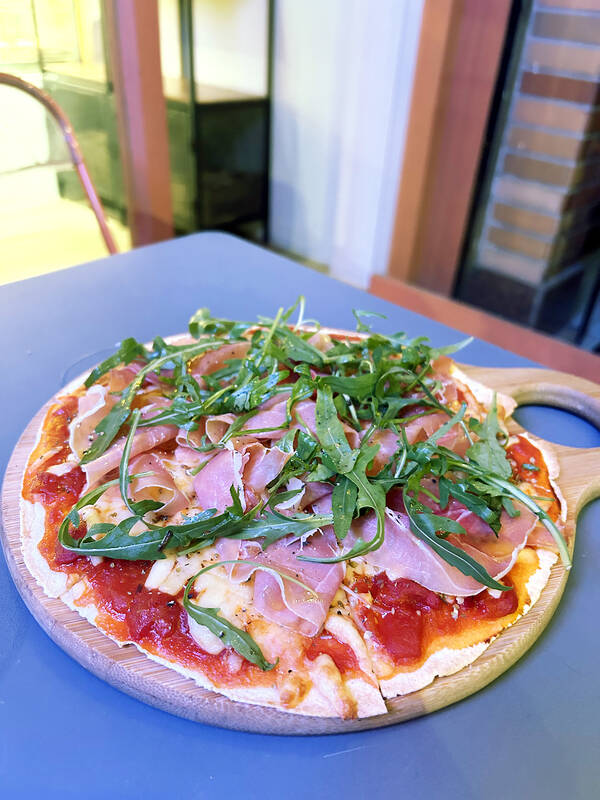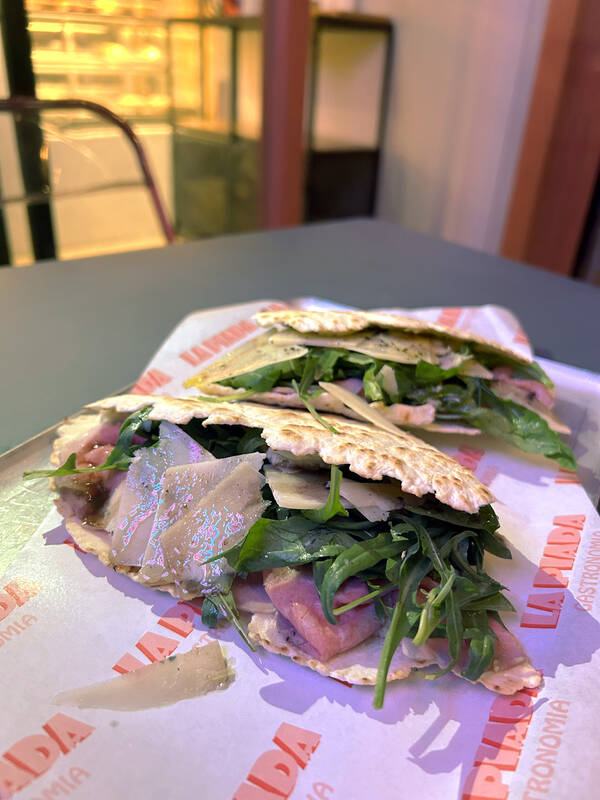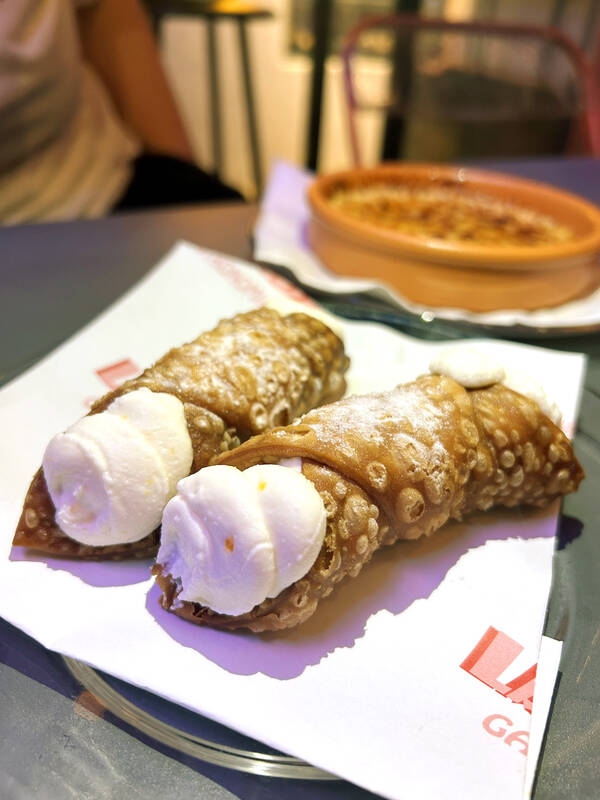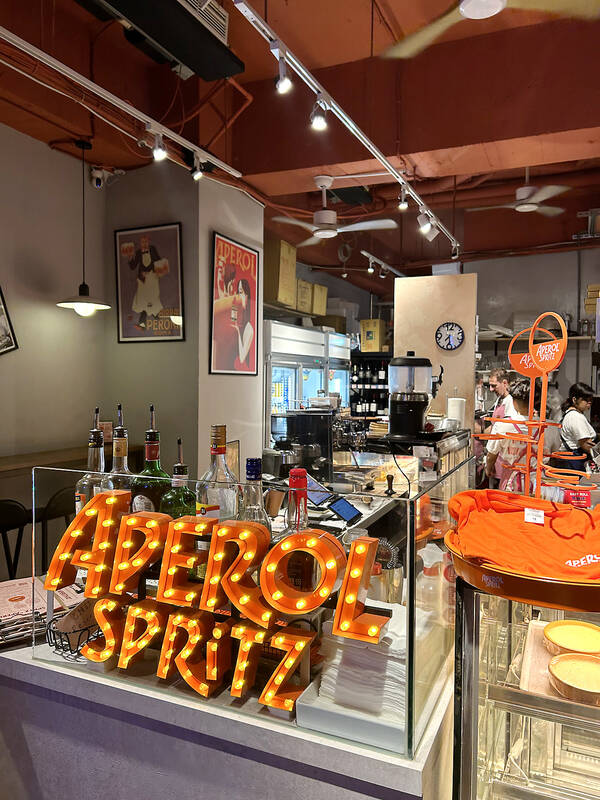There is perhaps no better way to soak up the last of Taipei’s balmy evenings than dining al fresco at La Piada with a sundowner Aperol Spritz and a luxuriant plate of charcuterie.
La Piada (義式薄餅) is the brainchild of Milano native William Di Nardo. Tucked into an unassuming apartment complex, fairy lights and wining diners lead the way to this charming slice of laid-back Mediterranean deli culture.
Taipei is entirely saturated with Italian cuisine, but La Piada offers something otherwise unseen on the island. Piadina Romagnola: a northern Italian street food classic. These handheld flatbreads are stuffed with cold cuts and tart cheeses aged like fine imported wine, also available here by the bottle.

Photo: Hollie Younger
The piada dough is a peasant recipe of humble beginnings; just flour, water, salt and pork fat. But if the bread is simple, the fillings at La Piada are anything but. Peppery rucola, delectably stringy proscuitto, tangy balsamic, salty shaved Parmesan — Italian flavor explosions of Mediterranean acid, moreish cold cuts and zingy fresh produce.
The first and only piada spot in Taiwan, Di Nardo moved his sandwich deli to this permanent Songshan District (松山) fixture in July 2022. With a culinary resume spanning from Italian kitchens to hotels in Shanghai and Jakarta, he now channels his expertise into this homely hidden gem, equal parts affordable and indulgent.
We step inside to the scent of freshly baked blue cheese onion quiches cooling on the counter and are greeted by the warm glow of La Piada and that world-famous Italian hospitality.

Photo: Hollie Younger
We begin as every diner here should: NT$640 will get you two aperitivo, sparkling Italian cocktails, and a generous plate of cold cuts: sliced beef, salami, provolone cheese and delicious locally-grown olives elevated with in-house chili garlic dressing.
We order one Aperol Spritz, a lighter, fruitier option, and one Campari Spritz, its darker, boozier cousin, both served bubbly with prosecco and soda.
Next up, we try the signature piada. We opt for the roast beef (NT$380), a textural delight packed with thinly sliced, medium-rare cold cuts, artichoke cream, arugula and Parmesan, splashed with a balsamic glaze. The dough is light and chewy, yet understated enough to leave the spotlight on the fresh fillings.

Photo: Hollie Younger
A must-order for the table is the mixed roasted veggie salad (NT$260); generous chunks of eggplant spliced with ribbons of carrot and zucchini on a bed of greens, topped, again, with slabs of Parmesan. This dish highlights local produce, with the acidic dressing cutting through the glutenous feast.
The menu also offers a piada and pizza hybrid creation: the piad-izza. We opt for the prosciutto and rucola (NT$380). We were grateful for the crispy and refreshingly light piada base, letting the toppings shine and leaving room for dessert, while even the tomato sauce highlights the care cooked into every element.
If that wasn’t quite enough carbs for one day, we follow the crowd and finish up with two house-made Sicilian cannoli (NT$150). Lightly fried cinnamon dough filled with lemony ricotta cream — it crackles with each bite. Our Catalana cream (NT$150), a shallower, lighter creme brulee still with that signature glassy top, delivers that perfect caramelized crunch.

Photo: Hollie Younger
La Piada also sells vegan and vegetarian options, plus an extensive homemade dessert selection. Di Nardo’s deli counter offers cheeses and meats for takeaway, frozen piada dough and lasagnas and a fantastic selection of imported wine and pastas.
This spot is lively even on a weeknight; our fellow diners have the same thought as us; girls’ night catch-ups with a bottle of red. Indoors invites bar-style seating and the patio offers small tables, covered and heated for year-round al fresco-ing.
And as we finish off our drinks aglow under the string lights, it’s easy to forget we’re in Taipei — La Piada brings a quiet slice of Italy to the city, inviting us to linger just a little longer.

Photo: Hollie Younger

Cheng Ching-hsiang (鄭青祥) turned a small triangle of concrete jammed between two old shops into a cool little bar called 9dimension. In front of the shop, a steampunk-like structure was welded by himself to serve as a booth where he prepares cocktails. “Yancheng used to be just old people,” he says, “but now young people are coming and creating the New Yancheng.” Around the corner, Yu Hsiu-jao (饒毓琇), opened Tiny Cafe. True to its name, it is the size of a cupboard and serves cold-brewed coffee. “Small shops are so special and have personality,” she says, “people come to Yancheng to find such treasures.” She

The low voter turnout for the referendum on Aug. 23 shows that many Taiwanese are apathetic about nuclear energy, but there are long-term energy stakes involved that the public needs to grasp Taiwan faces an energy trilemma: soaring AI-driven demand, pressure to cut carbon and reliance on fragile fuel imports. But the nuclear referendum on Aug. 23 showed how little this registered with voters, many of whom neither see the long game nor grasp the stakes. Volunteer referendum worker Vivian Chen (陳薇安) put it bluntly: “I’ve seen many people asking what they’re voting for when they arrive to vote. They cast their vote without even doing any research.” Imagine Taiwanese voters invited to a poker table. The bet looked simple — yes or no — yet most never showed. More than two-thirds of those

In July of 1995, a group of local DJs began posting an event flyer around Taipei. It was cheaply photocopied and nearly all in English, with a hand-drawn map on the back and, on the front, a big red hand print alongside one prominent line of text, “Finally… THE PARTY.” The map led to a remote floodplain in Taipei County (now New Taipei City) just across the Tamsui River from Taipei. The organizers got permission from no one. They just drove up in a blue Taiwanese pickup truck, set up a generator, two speakers, two turntables and a mixer. They

Former Chinese Nationalist Party (KMT) chairwoman Hung Hsiu-chu’s (洪秀柱) attendance at the Chinese Communist Party’s (CPP) “Chinese People’s War of Resistance Against Japanese Aggression and the World Anti-Fascist War” parade in Beijing is infuriating, embarrassing and insulting to nearly everyone in Taiwan, and Taiwan’s friends and allies. She is also ripping off bandages and pouring salt into old wounds. In the process she managed to tie both the KMT and the Democratic Progressive Party (DPP) into uncomfortable knots. The KMT continues to honor their heroic fighters, who defended China against the invading Japanese Empire, which inflicted unimaginable horrors on the